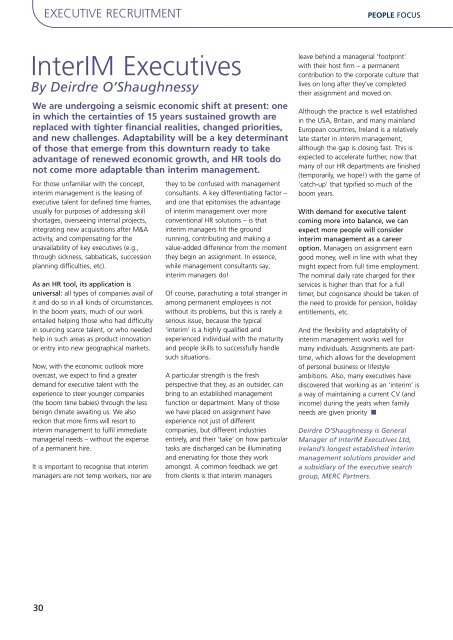PEOPLE FOCUS - CIPD
PEOPLE FOCUS - CIPD
PEOPLE FOCUS - CIPD
- TAGS
- people
- focus
- cipd
- www.cipd.co.uk
Create successful ePaper yourself
Turn your PDF publications into a flip-book with our unique Google optimized e-Paper software.
EXECUTIVE RECRUITMENT <strong>PEOPLE</strong> <strong>FOCUS</strong><br />
InterIM Executives<br />
By Deirdre O’Shaughnessy<br />
We are undergoing a seismic economic shift at present: one<br />
in which the certainties of 15 years sustained growth are<br />
replaced with tighter financial realities, changed priorities,<br />
and new challenges. Adaptability will be a key determinant<br />
of those that emerge from this downturn ready to take<br />
advantage of renewed economic growth, and HR tools do<br />
not come more adaptable than interim management.<br />
For those unfamiliar with the concept,<br />
interim management is the leasing of<br />
executive talent for defined time frames,<br />
usually for purposes of addressing skill<br />
shortages, overseeing internal projects,<br />
integrating new acquisitions after M&A<br />
activity, and compensating for the<br />
unavailability of key executives (e.g.,<br />
through sickness, sabbaticals, succession<br />
planning difficulties, etc).<br />
As an HR tool, its application is<br />
universal: all types of companies avail of<br />
it and do so in all kinds of circumstances.<br />
In the boom years, much of our work<br />
entailed helping those who had difficulty<br />
in sourcing scarce talent, or who needed<br />
help in such areas as product innovation<br />
or entry into new geographical markets.<br />
Now, with the economic outlook more<br />
overcast, we expect to find a greater<br />
demand for executive talent with the<br />
experience to steer younger companies<br />
(the boom time babies) through the less<br />
benign climate awaiting us. We also<br />
reckon that more firms will resort to<br />
interim management to fulfil immediate<br />
managerial needs – without the expense<br />
of a permanent hire.<br />
It is important to recognise that interim<br />
managers are not temp workers, nor are<br />
30<br />
they to be confused with management<br />
consultants. A key differentiating factor –<br />
and one that epitomises the advantage<br />
of interim management over more<br />
conventional HR solutions – is that<br />
interim managers hit the ground<br />
running, contributing and making a<br />
value-added difference from the moment<br />
they begin an assignment. In essence,<br />
while management consultants say;<br />
interim managers do!<br />
Of course, parachuting a total stranger in<br />
among permanent employees is not<br />
without its problems, but this is rarely a<br />
serious issue, because the typical<br />
‘interim’ is a highly qualified and<br />
experienced individual with the maturity<br />
and people skills to successfully handle<br />
such situations.<br />
A particular strength is the fresh<br />
perspective that they, as an outsider, can<br />
bring to an established management<br />
function or department. Many of those<br />
we have placed on assignment have<br />
experience not just of different<br />
companies, but different industries<br />
entirely, and their ‘take’ on how particular<br />
tasks are discharged can be illuminating<br />
and enervating for those they work<br />
amongst. A common feedback we get<br />
from clients is that interim managers<br />
leave behind a managerial ‘footprint’<br />
with their host firm – a permanent<br />
contribution to the corporate culture that<br />
lives on long after they’ve completed<br />
their assignment and moved on.<br />
Although the practice is well established<br />
in the USA, Britain, and many mainland<br />
European countries, Ireland is a relatively<br />
late starter in interim management,<br />
although the gap is closing fast. This is<br />
expected to accelerate further, now that<br />
many of our HR departments are finished<br />
(temporarily, we hope!) with the game of<br />
‘catch-up’ that typified so much of the<br />
boom years.<br />
With demand for executive talent<br />
coming more into balance, we can<br />
expect more people will consider<br />
interim management as a career<br />
option. Managers on assignment earn<br />
good money, well in line with what they<br />
might expect from full time employment.<br />
The nominal daily rate charged for their<br />
services is higher than that for a full<br />
timer, but cognisance should be taken of<br />
the need to provide for pension, holiday<br />
entitlements, etc.<br />
And the flexibility and adaptability of<br />
interim management works well for<br />
many individuals. Assignments are parttime,<br />
which allows for the development<br />
of personal business or lifestyle<br />
ambitions. Also, many executives have<br />
discovered that working as an ‘interim’ is<br />
a way of maintaining a current CV (and<br />
income) during the years when family<br />
needs are given priority ■<br />
Deirdre O’Shaughnessy is General<br />
Manager of InterIM Executives Ltd,<br />
Ireland’s longest established interim<br />
management solutions provider and<br />
a subsidiary of the executive search<br />
group, MERC Partners.

















